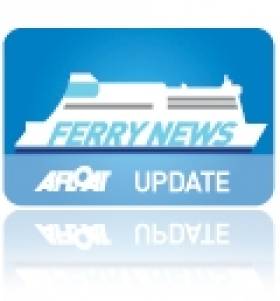Displaying items by tag: Shamrock Sailings
St. Patrick’s ‘Shamrock’ Symbol Still Sails Strong
#StPatricksShamrock – In addition to Celtic Link Ferries Cherbourg-Rosslare route ferry Celtic Horizon arrival to the Wexford port this St. Patrick's Day, Irish Ferries new service from the same Normandy port saw Epsilon dock in Dublin Port, writes Jehan Ashmore.
As previously reported this was Celtic Link's final St. Patrick's Day promotional sailing before the operator is taken over by Stena Line at the end of the month and contrasts to Irish Ferries first sailing on this national day on the direct continental service.
The Dublin-Cherbourg route is the third Ireland-France route option to compliment Irish Ferries established Rosslare routes to Cherbourg and Roscoff. Last year, the company celebrated 40 years of direct continental operations, having started in 1973 firstly between Rosslare and Le Havre.
At that time, the route was operated by Irish Continental Line, part of the state-owned Irish Shipping Ltd, which was inaugurated by the brand new Saint Patrick. She sported a white 'shamrock' painted on a green funnel to reflect the routes ownership origins and marketing to a continental audience.
This symbolic symbol of Ireland was given further coverage when Saint Patrick II made a special publicity cruise in Dublin Bay as part of the 'postcard' videos during the 1994 EuroVision Song Contest held at the Point Depot and the contest's hosting of interval act 'Riverdance'.
Since then the use of the shamrock has been increasingly involved to market the island of Ireland overseas by Aer Lingus and more so on a global stage by Tourism Ireland. As such the shamrock represents an easily recognisable symbol and remains on the ferry company successor, Irish Ferries, whose parent company is the Irish Continental Group.
Both Celtic Link's 2006 built Celtic Horizon and Irish Ferries 2011 built Epsilon (recently renamed) are chartered Visentini built ro-pax ferries of the same design and fitted out with a limited range of passenger facilities.
However, following the pending demise of Celtic Link Ferries with the entry of newcomer Stena Line on the direct continental service, an historic first for the company, this is no doubt to lead to new corporate colours and introduction of the Stena passenger experience.
























































